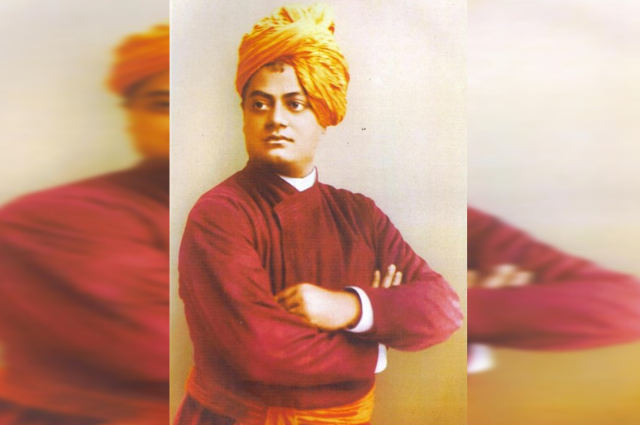Picture, if you will, an august figure emerging from the mists of history – a swami, not surrounded by an ashram, but one who traversed continents and minds like an explorer. Swami Vivekananda was no ordinary idol; he was a tempest, a maverick, and an archetype of audacity in the modern Indian narrative. Vivekananda was not cut from the same cloth as the usual stalwarts of history, nor was he content to dwell in the sanctified province of antiquity. In an age when conformity was the norm, he was an embodiment of nonconformity, the harbinger of a new epoch, attracting seekers and sceptics alike. He was not content to remain an ivory tower philosopher; he was the real-world leader, the profound activist.
Vivekananda's appeal to the youth was not about preaching platitudes or confining spirituality to the narrow precincts of rituals. No, it was a clarion call, a rhapsody of awakening, a wake-up message to jettison complacency and embark on a path of relentless self-discovery and nation-building. He didn't merely suggest; he challenged, he provoked, he demanded that the youth of India be the agents of their own destiny. Vivekananda serves as a vivid exemplification of bridging the chasm between the Occident and the Orient, the East and the West, promulgating a message of universal brotherhood and spiritual unification, by not subscribing to the ossified norms of his time but putting forth a new vision, a vision that saw beyond the superficial divides of religion and caste as inspired by the Vedanta; to establish a society where diversity was not divisive, but unifying.
At the heart of his disapproval lay a fervent aversion to the crippling dearth of self-confidence among the youth. He discerned a generation burdened by self-doubt and hesitancy. The ardent questioner urged them to shed the heavy mantle of self-distrust and embrace the inherent potency within. Rote learning was the pernicious norm of the education system in his day, maybe even today! He viewed it as a dulling mechanism, an assembly line of parrot-like students who could mimic but not innovate. But, according to Swami Vivekananda, it isn’t their fault; their sleep is never disturbed; their nice little brown studies of life are never rudely shocked by the wail of woe, misery and degradation. This is the school of misery. Religious bigotry and sectarianism, which were rampant in the then social net, clashed fiercely with Vivekananda's vision of harmony. This brings up a question: are we still bound by the shackles of such a discrimination? Are we doing anything to remove these? Swamiji detested the division and animosity that these divisive dogmas perpetuated. The rigid caste system and the scourge of untouchability challenged Vivekananda’s idea of a society that recognized the inherent equality of all individuals and vehemently condemned these discriminatory practices, without riddling with hierarchy, and generally succumbed by the dire army of infatuation. Apathy and complacency, the twin spectres of the age, were his constant foes.
Swami Vivekananda stands as the quintessential idol of modern India due to the profound resonance of his visionary ideals with the contemporary ethos. In the 1893 World's Parliament of Religions in Chicago, Vivekananda's resplendent oration skillfully unveiled the essence of India's spiritual ethos. His celebrated address, which commenced with the greeting of "Sisters and Brothers of America," not only captivated the audience but also crystallized the spirit of universal brotherhood that remains an enduring hallmark of his legacy. Vivekananda's foray into social reform further solidified his stature as a beacon for modern India. His rejection of the orthodox caste system, manifested in his unyielding condemnation of untouchability, represented his commitment to a societal fabric woven with the threads of egalitarianism. Furthermore, Vivekananda's advocacy for the integration of spirituality and practicality in daily life provides a blueprint for navigating the challenges of the modern era. His teachings on self-confidence and the pursuit of excellence resonate in the corridors of corporate boardrooms, educational institutions, and social initiatives, where his wisdom continues to inspire meaningful endeavors.
In a world where conformity often stifles individuality, Swami Vivekananda's legacy is an ode to the power of daring to be different. Let the youth of our country pragmatize the utopian state of the country envisaged by Swami Vivekananda.

